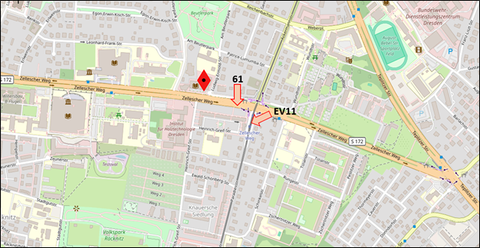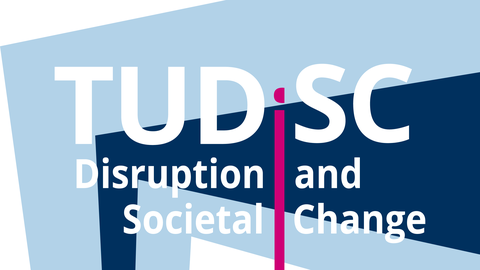Guest Information
Venue: Open Science Lab
The conference is going to take part at the Open Science Lab, located at Zellescher Weg 25, 01069 Dresden. The lab adheres to the principles of open, transparent, and accessible science, making it an ideal venue for our event.
You can reach the conference location via bus lines 61, 63, or tram 11.
The conference is being held on the 2nd floor, accessible by both an elevator and stairs.
We won’t provide an option of participating online but are very much looking forward to meeting you in person.
Contact Details
The conference is organized by the Disruption and Societal Change Center TUDiSC.
For any inquiries regarding the conference program or content, please contact:
Prof. Dr. Marianne Kneuer
Chair of Political Systems and Comparative Politics
For questions related to organizational matters please contact:
Clara Jacobi
Scientific Coordinator
How to get to Dresden
Dresden is easily accessible by all kinds of transport. Located in the heart of Central Europe, Dresden boasts a rich history and excellent connections to neighboring countries. You can reach the city by car via the well-connected highways A4, A13 and A17, by plane through Dresden Airport, or by bus from major European cities. For those preferring train travel, Dresden is well-served by regular train connections from cities like Berlin, Frankfurt, Prague, and Munich.
We offer special discounted train tickets for those traveling to Dresden. They can be booked for a maximum of 58€ (one way): https://www.veranstaltungsticket-bahn.de/?event=30421&language=en
Things to do and see in Dresden
At almost 600 years old, Dresden’s “Striezelmarkt" is deemed to be the oldest Christmas Market not only in Germany, but quite possibly in the entire world. From November 26th till December 24th the Altmarkt will be transformed into a glittering festive wonderland with numerous alleys and squares to explore. Merchants offer here, among other things, Erzgebirge folk art, and delicious specialties, for which flocks of visitors travel annually from all over the world. This is also the location for the performance stage where highlights from the Advent events calendar can be found.
We are inviting you to join us at a Christmas Market visit on November 26th, followed by an optional visit to the opera “Turandot” at the famous Semperoper.
Tickets to the opera are available here
Furthermore, Dresden offers a lot of amazing museums. If you find the time, visit the beautiful art museums like the Albertinum, the Old Masters Picture Gallery or the world famous Semperoper. Discover the splendid architecture of the opera house and all its mysteries or enjoy the breathtaking performances with its broad mix of revivals and brand-new productions.
How to use public transport in Dresden
Within the city, Dresden’s public transport offers trams, trains, buses, ferries, as well as bike services which make it possible to get around the city and its surroundings easily and inexpensively.
The transport service DVB operates all trams, buses, ferries, as well as some rental bike and car services in the city. Trains are generally operated by the Deutsche Bahn but accept tickets from the DVB within the city as well. The DVB operates a mobile app service and several service points (e.g., at Dresden Main Station and Prager Straße) which allow visitors to buy single fares, groups fares, day tickets or one-week-passes.
Tickets for the DVB can also be purchased through the app of the Deutsche Bahn. The rental bike service MOBIbike/Nextbike allows visitors and inhabitants alike to get around with rental bikes all over the city. Please make sure to validate your ticket in the trams or buses.
Disruption and Societal Change Center TUDiSC
The measure "Disruption and Societal Change” (TUDiSC) is part of the endeavor "Strengthening research areas with great potential" in the EXU focus PROFILE. It is intended to contribute to achieving scientific excellence and international visibility in all five Research Priority Areas of TUD, especially in the Emerging Field “Societal Change”, and thus to develop the university as a whole to a high level.
In joint interdisciplinary work, the aim is to elevate disruption to a basic category of research into societal change and to record its preconditions, logics and effects more precisely in a basic-oriented and exemplary subject-related manner.
To the extent that this brings into focus the political, economic, social and cultural challenges that societies face in dealing with disruptions, TUDiSC has a social science, humanities and cultural studies orientation, but necessarily includes the expertise of natural, technical and life sciences in addressing these issues. In eight subprojects, interdisciplinary work explores the dimensions of societal change and challenges the scientific work of the 21st century by experimenting with new formats, collaborations, and ideas.
To keep updated on our latest research and events, you can subscribe to our newsletter!


